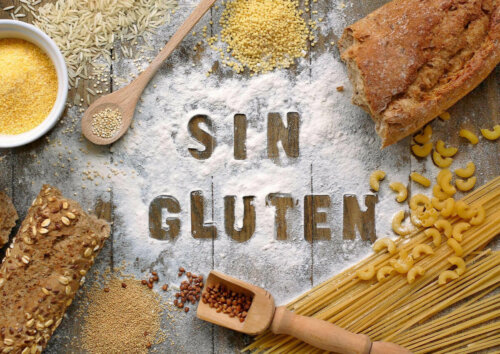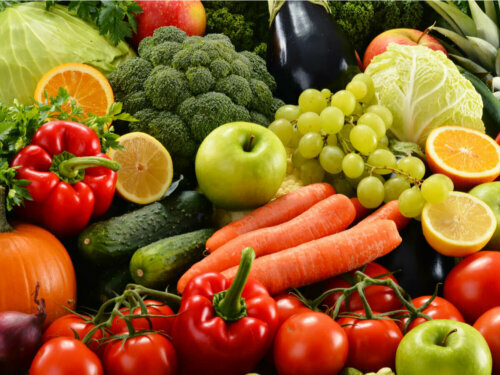The Appropriate Diet for Coeliac Patients

Individuals with hypersensitivity to gluten must watch what they eat at all times. Eating the wrong foods can cause them serious discomfort, which can become worse over time. For this reason, it’s necessary to learn more about the appropriate diet for coeliac patients.
Coeliac disease is a condition that usually arises during the early stages of life as it’s marked by a strong genetic component. It refers to the inability to metabolize gluten, which causes a hyperarousal of the immune system, which is harmful in both the short and medium-term.
The process of eliminating gluten from the diet
One of the most relevant aspects of the diet of coeliac patients is gluten restriction. According to research published in the European Journal of Nutrition, eliminating such protein from the diet is crucial.
Fortunately, there are multiple foods free of this allergen on the market. In this way, coeliac patients are still able to meet their nutritional demands.
Furthermore, it’s essential to avoid cross-contamination. People suffering from this pathology are very sensitive to foods that have come into contact with traces of gluten. Such a situation can occur, for example, if a person handles different foods with the same kitchen utensils.
According to a study published in the Journal of Food Protection, coeliac patients have to be especially careful when it comes to food hygiene. In this way, they avoid acute symptoms and a defect in intestinal functioning derived from the regular intake of small particles of gluten.

Coeliac patients should still have a varied diet
The most important rule here is, again, forgetting about gluten intake. Other than that, they may consume all kinds of foods to guarantee the contribution of all the nutrients that their body needs. Let’s see the products they must avoid:
- Flours.
- Cereals, except oats.
- Pasta and derivatives.
- Pastry and sweets.
- Bread.
With these limitations, carbohydrate consumption has to be guaranteed through rice and root vegetables, such as potatoes and sweet potatoes. At the same time, they may introduce legumes into their diet which, in addition to being rich in complex sugars, contain a lot of fiber.
On the other hand, it’s necessary that they get adequate protein intake; meat, fish, and eggs should always be a part of their diet.
Dairy products, except for some type of intolerance or allergy to cow proteins, are also recommended. In this way, it’s possible to incorporate proteins of high biological value that guarantee the presence of all essential amino acids.
The need for vegetables in coeliac patients
Coeliac patients must follow a diet that contains the necessary vegetables to guarantee a regular supply of antioxidants and phytonutrients. These substances help to delay aging and prevent the appearance of complex diseases.
Vegetables don’t have gluten in their composition. For that reason, the only time when they should be careful with their consumption is when there’s the risk of cross-contamination.
Now, it’s important to note that it isn’t advisable to opt for their battered versions. The use of flours would already limit their intake unless it’s a gluten-free flour, which currently exists on the market. In any case, these varieties have notably different organoleptic qualities than their counterparts with protein.

The importance of paying attention to the diet
Coeliac patients have to be extremely careful with the foods they include in their diet. The purpose of this is to prevent discomfort and intestinal problems. In the case that one of them ends up consuming gluten, there may be a progressive increase in the permeability of the intestinal barrier. As a result, they’ll suffer from greater and more serious dysfunctions.
However, the presence of essential macro and micronutrients should be guaranteed. When it comes to carbohydrate consumption, the best option will always be legumes and tubers. In addition, consuming protein and healthy fats abundantly is very positive.
In brief, vegetables must be the basis of the diet since they provide the antioxidants and vitamins necessary to prevent the appearance of complex diseases. Of course, and to conclude, keep in mind that coeliac patients must always consult a nutritionist when looking to plan their diet.
Individuals with hypersensitivity to gluten must watch what they eat at all times. Eating the wrong foods can cause them serious discomfort, which can become worse over time. For this reason, it’s necessary to learn more about the appropriate diet for coeliac patients.
Coeliac disease is a condition that usually arises during the early stages of life as it’s marked by a strong genetic component. It refers to the inability to metabolize gluten, which causes a hyperarousal of the immune system, which is harmful in both the short and medium-term.
The process of eliminating gluten from the diet
One of the most relevant aspects of the diet of coeliac patients is gluten restriction. According to research published in the European Journal of Nutrition, eliminating such protein from the diet is crucial.
Fortunately, there are multiple foods free of this allergen on the market. In this way, coeliac patients are still able to meet their nutritional demands.
Furthermore, it’s essential to avoid cross-contamination. People suffering from this pathology are very sensitive to foods that have come into contact with traces of gluten. Such a situation can occur, for example, if a person handles different foods with the same kitchen utensils.
According to a study published in the Journal of Food Protection, coeliac patients have to be especially careful when it comes to food hygiene. In this way, they avoid acute symptoms and a defect in intestinal functioning derived from the regular intake of small particles of gluten.

Coeliac patients should still have a varied diet
The most important rule here is, again, forgetting about gluten intake. Other than that, they may consume all kinds of foods to guarantee the contribution of all the nutrients that their body needs. Let’s see the products they must avoid:
- Flours.
- Cereals, except oats.
- Pasta and derivatives.
- Pastry and sweets.
- Bread.
With these limitations, carbohydrate consumption has to be guaranteed through rice and root vegetables, such as potatoes and sweet potatoes. At the same time, they may introduce legumes into their diet which, in addition to being rich in complex sugars, contain a lot of fiber.
On the other hand, it’s necessary that they get adequate protein intake; meat, fish, and eggs should always be a part of their diet.
Dairy products, except for some type of intolerance or allergy to cow proteins, are also recommended. In this way, it’s possible to incorporate proteins of high biological value that guarantee the presence of all essential amino acids.
The need for vegetables in coeliac patients
Coeliac patients must follow a diet that contains the necessary vegetables to guarantee a regular supply of antioxidants and phytonutrients. These substances help to delay aging and prevent the appearance of complex diseases.
Vegetables don’t have gluten in their composition. For that reason, the only time when they should be careful with their consumption is when there’s the risk of cross-contamination.
Now, it’s important to note that it isn’t advisable to opt for their battered versions. The use of flours would already limit their intake unless it’s a gluten-free flour, which currently exists on the market. In any case, these varieties have notably different organoleptic qualities than their counterparts with protein.

The importance of paying attention to the diet
Coeliac patients have to be extremely careful with the foods they include in their diet. The purpose of this is to prevent discomfort and intestinal problems. In the case that one of them ends up consuming gluten, there may be a progressive increase in the permeability of the intestinal barrier. As a result, they’ll suffer from greater and more serious dysfunctions.
However, the presence of essential macro and micronutrients should be guaranteed. When it comes to carbohydrate consumption, the best option will always be legumes and tubers. In addition, consuming protein and healthy fats abundantly is very positive.
In brief, vegetables must be the basis of the diet since they provide the antioxidants and vitamins necessary to prevent the appearance of complex diseases. Of course, and to conclude, keep in mind that coeliac patients must always consult a nutritionist when looking to plan their diet.
All cited sources were thoroughly reviewed by our team to ensure their quality, reliability, currency, and validity. The bibliography of this article was considered reliable and of academic or scientific accuracy.
- Bascuñán KA., Vespa MC., Araya M., Celiac disease: understanding the gluten free diet. Eur J Nutr, 2017. 56 (2): 449-459.
- Studerus D., Hampe E., Fahrer D., Wilhelmi M., et al., Cross contamination with gluten by using kitchen utensils: fact or fiction? J Food Prote, 2018. 81 (10): 1679-1684.
This text is provided for informational purposes only and does not replace consultation with a professional. If in doubt, consult your specialist.








